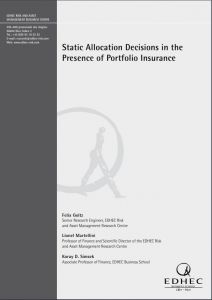

Static Allocation Decisions in the Presence of Portfolio Insurance
This paper attempts to determine what fraction a static investor should optimally allocate to investment strategies with convex exposure to stock market returns in a general economy with stochastically time-varying interest rates and stock market excess returns. The results obtained using Monte Carlo analysis show that investors should allocate between 45% and 63% of their portfolio to such portfolio insurance strategies. Moreover, the inclusion of portfolio insurance strategies leads to important utility gains. The results are robust with respect to the choice of the objective, the presence of realistic levels of market friction, heterogeneous expectations on volatility, and various parametric assumptions. A revisited version of this paper was published in the Journal of Investment Management, Vol. 6 Nº. 2, Second Quarter 2008.
Author(s):
Summary:
This paper attempts to determine what fraction a static investor should optimally allocate to investment strategies with convex exposure to stock market returns in a general economy with stochastically time-varying interest rates and stock market excess returns. The results obtained using Monte Carlo analysis show that investors should allocate between 45% and 63% of their portfolio to such portfolio insurance strategies. Moreover, the inclusion of portfolio insurance strategies leads to important utility gains. The results are robust with respect to the choice of the objective, the presence of realistic levels of market friction, heterogeneous expectations on volatility, and various parametric assumptions. A revisited version of this paper was published in the Journal of Investment Management, Vol. 6 Nº. 2, Second Quarter 2008.
Register to download PDF
Register/Log in| Type : | Working paper |
|---|---|
| Date : | 05/06/2008 |
| Keywords : |
Asset Allocation |

